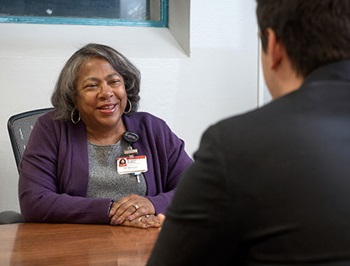 It takes a special type of person to comfort, console and counsel people, often strangers, in times of crisis, including illness, trauma and death.
It takes a special type of person to comfort, console and counsel people, often strangers, in times of crisis, including illness, trauma and death.
It also takes a special type of training, called clinical pastoral education.
Referred to as CPE for short, it is an interfaith professional program that helps theological students, ordained clergy, members of religious orders and qualified laypersons develop the interpersonal skills needed to work as chaplains or spiritual care providers.
CPE is the primary training method for hospital and hospice chaplains in the United States, Canada, Australia and New Zealand but it also prepares people to work in rehabilitation and residential care facilities, crisis centers and shelters, schools and colleges, police and fire departments, emergency medical services and correctional institutions.
“We provide emotional and spiritual support during crises and a listening presence to people of all faiths and people of no faith,” said the Rev. Rosalind Bradley, a chaplain supervisor at Wake Forest Baptist Medical Center and the admissions coordinator of its CPE program. “There are things you have to learn to be able to do that effectively.
“Most seminaries have classes in pastoral care, but they’re usually lectures without a lot of hands-on experience. In CPE, there are 300 hours of clinical work to every 100 academic hours, so the emphasis is definitely on working directly with people.”
The CPE program at Wake Forest Baptist is one of approximately 350 across the country accredited by the Association for Clinical Pastoral Care, a U.S. Department of Education-recognized nonprofit organization with about 2,300 members.
Wake Forest Baptist’s CPE curriculum has three introductory-level internship programs (one in the summer and two that run from August to May), a one-year “general practice” residency program, a one-year fellowship program for those who want to specialize in a specific area (such as palliative care), and a three-year residency for a person seeking CPE educator certification. This year the Wake Forest Baptist CPE program has enrolled 30 participants.
The learning is definitely experiential. The interns in the August-to-May programs are required to do 10 to 12 hours a week of supervised field work, either at Wake Forest Baptist or another institution. The summer interns, residents and fellows all spend at least 40 hours a week providing pastoral care in the medical center, including both routine visits and crisis calls.
“Chaplains are available here 24/7, so the interns, residents and fellows get to experience just about everything we do,” Bradley said.
The CPE students at Wake Forest Baptist work alongside the six full-time staff chaplains – three Baptist, one United Church of Christ, one nondenominational, one Buddhist – who serve patients, families and employees at the 885-bed medical center and students and staff at Wake Forest School of Medicine.
The chaplains on duty at Wake Forest Baptist are complemented by adjunct chaplains in the Winston-Salem area who are on call for emergencies and requests for a cleric of a specific faith.
“We have Catholic, Jehovah’s Witness, Orthodox, Islamic, Jewish, you name it,” said Bradley, who is an ordained Baptist minister. “We’re all about interfaith.”
Local clergy members also back up the staff chaplains at Wake Forest Baptist Health’s community hospitals in High Point (which has two) and Lexington, North Wilkesboro and Davie County (which have one each).
One point of emphasis in CPE is that chaplains are not missionaries.
“During orientation it’s made very clear that we do not proselytize,” Bradley said. “We support people if they’re having a crisis of faith but we’re not here to win souls for Jesus or to condemn people if they’re atheist.
“And we’re not pushy. If we were they’d throw us out of the hospital.”
Instead, Bradley promotes the power of listening.
“Everybody thinks they know how to solve other people’s problems,” she said. “The challenge is how we listen to people to help them explore who they are, how they are dealing with whatever their situation or crisis is and what their coping skills are, then helping them find their own solutions.
“CPE is often thought of only as a program to train people to be chaplains, but I see it as a program that trains clergy how to be with people, especially people experiencing a crisis. It also gives them the opportunity to reflect. People leave CPE with knowledge, skills and experience, but also a greater sense of self.”
Media Contacts
Wayne Mogielnicki, wmogieln@wakehealth.edu, 336-716-8043
Marguerite Beck, marbeck@wakehealth.edu, 336-716-2415
